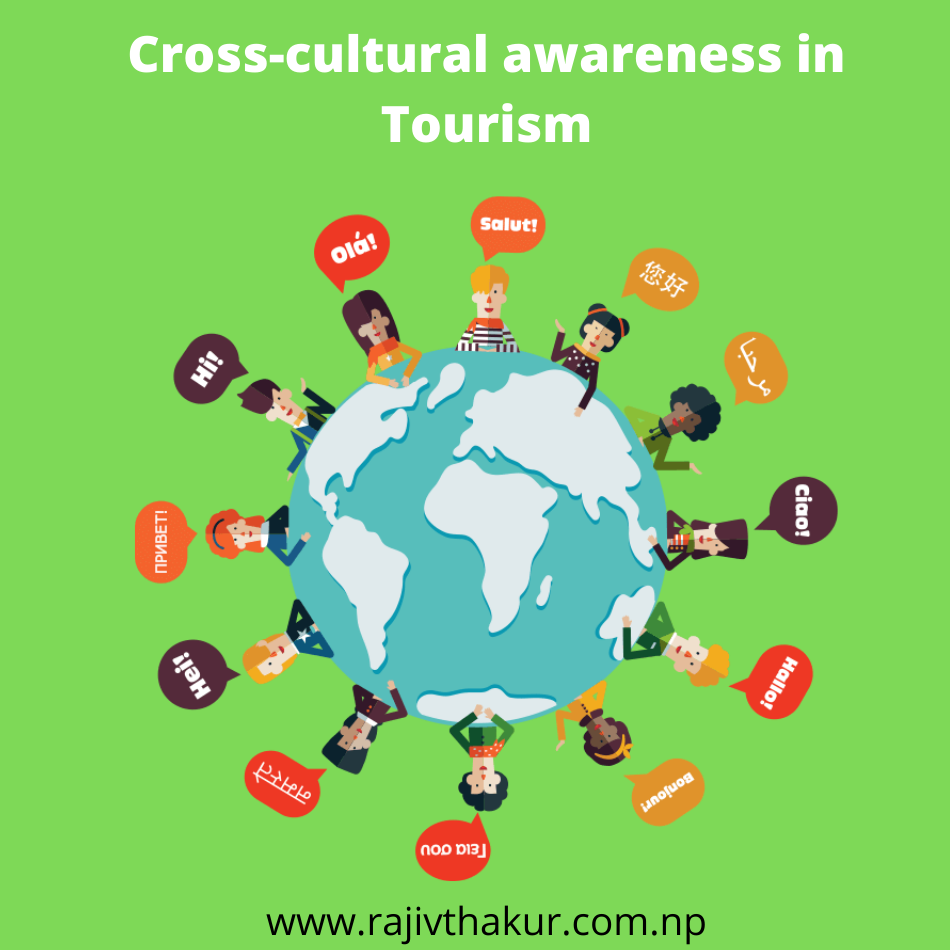Table of Contents
Cross-cultural awareness in Tourism
Culture:
Cross-cultural / Culture refers to the collective behavior of people that reflects their knowledge, experience, beliefs, values, attitudes, meanings, hierarchies, religion, etc. It is a complex whole and is usually practiced differently in different parts of the world. Cross-cultural behavior in tourism makes a major contribution to understanding cultural differences across nations and the impact of host and guest behavior. Failure to understand the local culture and take action may lead to cultural shock. Hence, it is good to be aware of cross-cultural things that raise awareness and understanding of others’ cultures and facilitate the process of communication as well.
People in the tourism sector should consider the following points while dealing with guests from different Cross-cultural:
General:
In general, especially western tourists have a habit of living in very neat, clean, and quiet surroundings; eating quality and hygienic food, and maintaining their own privacy and physical space. We should be respecting their behavior in these aspects. (especially to maintain their physical space and privacy, do not hold their hands or touch their body unnecessarily). Apart from this, the followings are a few tips to deal with specific nationalities from different parts of the world.

-
Indians
- Travel in groups of friends and family
- Quality seeking
- Like to be addressed by sir/madams.
- Enjoy a man-made environment and beauty.
- Love to gamble
- Religious
- Do a lot of bargaining on purchase
- Fond of culture and tradition.
- Very specific on the value of money
- Look for Indian food
- Have a hard time adjusting to changes in living style.
-
Americans
- Man of word, promising character, and quick decision-maker.
- Very Punctual
- Seek the value of money.
- Like to address by their name.
- Seek cleanliness and hygiene.
- Very much participate in history, culture, and religion.
- Want everything to be systematic.
- More Friendly and informal.
- Love to travel alone and have freedom.
- Nature lovers and thrill-seekers.
- Adapt readily to any environment.
- Complain about the spot and very demanding.
-
British/English
- Very formal and want perfection in everything.
- Polite and very strict on matters of punctuality.
- Disciplined and well-mannered.
- Ready to share group interest.
- Travel alone or in a group.
- Interested in nature and culture.
- Do not readily participate but love to observe.
- Diplomatic and business-minded
- Expect a high degree of cleaning and grooming.
-
Japanese
- Enjoy natural beauty and mountains.
- Polite, gentle and Love to travel in family or group.
- Neat and clean
- Man of few words.
- Hardworking and social.
- Enjoy shopping and indoor restaurants.
- Punctual and like everything to be planned beforehand.
- Listen to seniors and are disciplined.
- Mostly hard to communicate in the English language.
- Never complain also never come back.
-
German
- Enjoy walking & trekking.
- Like to know everything in detail.
- Keep close relationships & friendships.
- Good behavior among friends.
- Enjoy open dining.
- Man of few words.
- Love to lead.
- Very strict on matter of punctuality.
- Very open-minded but get offended very easily.
-
Italian/Spanish/French
- Formal and friendly.
- Enjoy songs, music, and arts.
- Enjoy the countryside than the city tour.
- Jolly and easy-going.
- Love gathering and ceremonies.
- Poor communication skills in the English language.
- Like individual freedom.
- Found of art, music & regional food.
-
Israeli
- Man of many words.
- Gambler
- Very strict in religious matter
- Like to address by their surnames.
- Love to listen to songs and music
- Poor communication skills in the English language.
- Very punctual and time bonded
- Like to travel in a group or with friends.
These cross-culture characteristics are purely observational and sound not be treated as detailed psychological evaluations.
- When a Nepali gives both hands in greetings or thanks, it is more respectful.
- Nepalese walk around temples in a clockwise direction.
- Hindu temples normally do not allow Westerners.
- Leather articles are prohibited inside the temple.
- Most Nepali people consider the head as a sacred place. Touching other people’s heads is not good.
- Nepalese do not expose their body when they change their dress, even in a room with the same sex.
- Nepali people do not often openly speak about sex.
- Nepalese never touch anything else with the hand they are eating until they wash it with water.
- Nepalese never take food from another’s plate.
- Nepalese do not point the soles of their feet at another person. A Nepali does not step over people, food, books (anything written) and if he/she does then they apologize.
- Nepalese take off their shoes before entering rooms/houses.
- Upside-down shoes are a bad luck sign for Nepalese.
- Nepalese do not give or receive with their left hand except in exceptional situations (if someone is eating with his right hand).
- Physical interaction with the same sex (holding hands and linked arms) is acceptable.
- Interaction between the sexes is never physical in public, even for husband and wife.
- Nepalese do not have the same concept of privacy that Westerners do.
Some Nepalese folk beliefs:
- The howling of dogs forecasts that something unpleasant is about to happen.
- A menstruating woman should not do any cooking or worshipping; she is untouchable for four days.
- To see a funeral is a sign of good luck.
- To see an empty vessel before leaving on a journey is bad luck. Therefore families put a vessel full of water near the door/gate at the time of departure.
- When departing for a journey, sneezing is a sign of bad luck.
Developing entrepreneurship skills and marketing of tourism-related products









